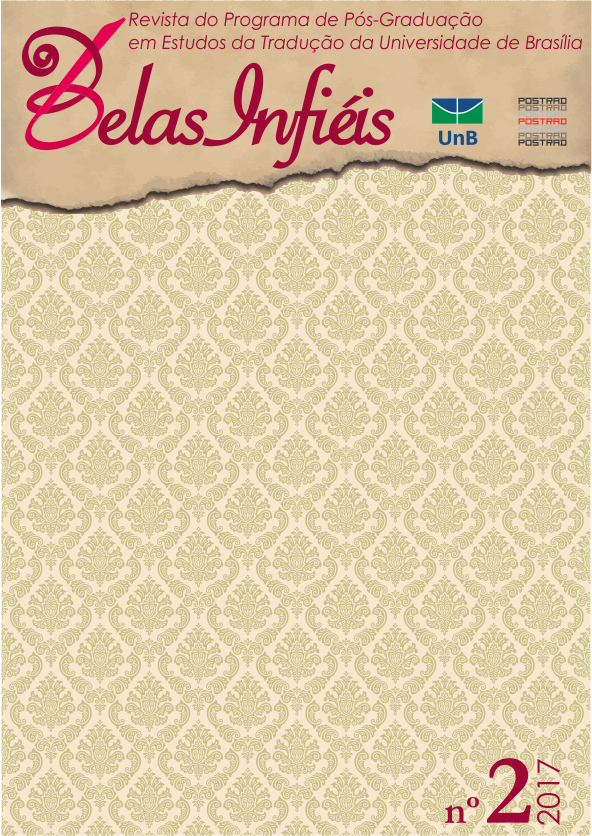A LITERATURA ALEMÃ DE WOLFGANG MENZEL, RESENHADA POR HEINRICH HEINE:
TRADUÇÃO COMENTADA
DOI:
https://doi.org/10.26512/belasinfieis.v6.n2.2017.11461Keywords:
Heinrich Heine, Jovem Alemanha, Recepção de Goethe, Wolfgang MenzelAbstract
Die deutsche Literatur von Wolfgang Menzel (1828) não é apenas uma das resenhas mais conhecidas de Heinrich Heine, mas também um importante documento sobre a cultura alemã em sua fase de transição do romantismo para a literatura da Jovem Alemanha (Junges Deutschland). O presente artigo, além de trazer a tradução integral do texto em questão, faz uma leitura que visa a evidenciar as principais tensões vividas por escritores naquele momento de assumida estagnação cultural e censura política. Heine se vale do registro da resenha para propor um programa estético inovador, e o faz declarando o final do Período da Arte (Kunstperiode) representado por Johann Wolfgang von Goethe e os teóricos do romantismo.
Downloads
References
BÜTTNER, Frank. Der Streit um die ‚Neudeutsche Religios-Patriotische Kunst‘. Aurora, n. 43 (1983), p. 55-76.
DREWITZ, Ingeborg. „Wir müssen etwas tun, was Ersatz ist für das, was wir tun könnten. Die Autoren des Jungen Deutschland und Goethe“. In: BUCH, Hans Christoph. Literatur-magazin 2. Von Goethe lernen? Fragen der Klassikrezeption. Hamburg: Rowohlt Taschenbuch Verlag, 1974, p. 113-119.
FRANK, Hilmar. „Anzeigen, Kritiken, Rezensionen zur bildenden Kunst“. In: DAHNKE, Hans-Dietrich & OTTO, Regine. Goethe Handbuch, Bd. 3. Stuttgart / Weimar: J. B. Metzler, 2004, p. 640-654.
GUTZKOW, J. Karl. Wolfgang Menzel und das „Junge Deutschland“. Neue Freie Presse. Wien. Nr. 3153, 4. Juni 1873, p. 1-3.
HABERMAS, Jürgen. Heinrich Heine e o papel do intelectual na Alemanha. Tradução de Priscila Figueiredo e Luiz Repa. Cadernos de Filosofia Alemã, n. 3, p. 79-105, 1997.
HÄNTZSCHEL, Günter. Das Ende der Kunstperiode? Heinrich Heine und Goethe. (2003). In: Goethezeitportal. Disponível em: <http://www.goethezeitportal.de/db/wiss/epoche/haentzschel_kunstperiode.pdf>. Acesso em: 11/01/2017).
HEINE, Heinrich. Die deutsche Literatur von Wolfgang Menzel. 2 Theile. Stuttgart, bei Gebrüder Frankh. 1828. Neue allgemeine politische Annalen. Bd. 27, 1828, Heft 3, p. 284-298. Versão facsímile disponível em <https://www.uni-due.de/lyriktheorie/scans/1828_heine.pdf >. Acesso: 11/01/2017.
_____________. Die romantische Schule. Hamburg: Hoffmann und Campe, 1836. Versão facsímile disponível em <https://books.google.com.br/books?id=VqkDAAAAQAAJ>. Último acesso: 14/01/2017.
_____________. Säkularausgabe. Werke, Briefwechsel, Lebenszeugnisse. Band 20: Briefe 1815-1831. Berlin: Akademie-Verlag, 1970.
_____________. Contribuições à História da Religião e Filosofia na Alemanha. Tradução Márcio Suzuki. São Paulo: Iluminuras, 1991.
HOHENDAHL, Peter Uwe. “The Epoch of Liberalism, 1820-1870”. In: HOHENDAHL, Peter Uwe (org.). A History of German Literary Criticism: 1730-1980. Lincoln / London: University of Nebraska Press, 1988, p. 179-276.
HÖHN, Gerhad. Heine Handbuch. Zeit, Person, Werk. Stuttgart/Weimar: Verlag J.B. Metzler, 2004.
IMMERMANN, Karl. Werke. Herausgegeben von Benno von Wiese, Band 1, Frankfurt a.M. / Wiesbaden: Athenäum, 1971.
KOPELEW, Lew. Ein Dichter kam vom Rhein. Heinrich Heines Leben und Leiden. Berlin: Severin und Siedler, 1981.
LAUSTER, Martina. Vom Körper der Kunst. Goethe und Schiller im Urteil Heines, Börnes, Wienbargs und Gutzkows (1828-1840). Goethe Jahrbuch, Band 122. Göttingen: Wallstein Verlag, 2005, p. 187-201.
OROSZ, Magdolna. Heine und die deutsche Romantik. Arbeiten zur deutschen Philologie, XXVI, 2002, p. 105-122.
SAFRANSKI, Rüdiger. Romantismo: uma questão alemã. Tradução Rita Rios. São Paulo: Estação Liberdade, 2010.
VERBOT DER SCHRIFTEN DES »JUNGEN DEUTSCHLAND « vom 10. Dezember 1835 (31. Sitzung der Bundesversammlung, 1835). Disponível em: <http://www.heinrich-heine-denkmal.de/dokumente/beschluss.shtml>. Acesso em: 14/01/2017.
Downloads
Published
How to Cite
Issue
Section
License
Given the public access to this journal, the texts are free to use but requires the recognition of the original authorship and initial publication in this journal to be properly stated.
 The journal allows the use of works published for non-commercial purposes, including the right to submit the work to publicly accessible databases. Published contributions are the sole and exclusive responsibility of the author(s).Â



















